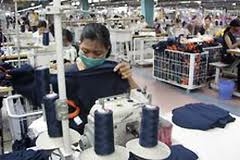Troubled access to global supply chain
 |
| illustration photo |
Many multi-national corporations have come to Vietnam to set up global production supply chains in diverse industries like retail, logistic and electronics.
However, few local businesses in Vietnam possess the ability to participate in these supply chains.
For example, with the supporting industry a Japan External Trade Organization (JETRO) report shows that the localisation rate of Japanese companies in Vietnam was only 28.7 per cent, while the figures are 59.7 per cent for China, 53 per cent for Thailand and 39.3 per cent for Malaysia, respectively.
Among the suppliers of spare parts and components for Honda Vietnam, there are 19 local Vietnamese suppliers and 59 foreign-invested companies.
“That is why production costs in Vietnam are higher than those in countries with higher localisation rate and products made in Vietnam then became less competitive,” said JETRO director Yoshida Sakae.
Truong Thi Chi Binh, director of Supporting Industry Development Enterprises Centre (SIDEC), said: “Large corporations such as Toyota already have companies based in Thailand and Japan as their traditional parts suppliers.”
“Therefore, Toyota will only replace these suppliers in the worst case scenarios of earthquakes and tsunamis. Whereas, the supply of materials and components for Japanese companies in Vietnam over the last few years has not improved,” she added.
The textile sector also finds itself in the same situation.
Out of 3,700 businesses in this sector, textile companies account for the majority of 70 per cent, while textile weaving, threading and dyeing firms occupy only 17. 6 and four per cent, respectively.
The textile supply chain is also hindered by the lack of a production chain to help transform wool into fashion garments, hence finished products come below international standards.
This is the issue heating up the Hanoi Supply Chain Conference 2012 held in Hanoi by the independent and non-profit organisation Vietnam Supply Chain.
Dang Tien Thanh, director of Vinafco Logistics Limited Company, said that Vietnamese businesses only focused on marketing and sales, while neglecting investment in distribution to get their products reach the consumers in the timeliest possible manner.
In reality, the supply chain and logistics infrastructure act as the lifeblood of the economy as well as businesses. The prosperity of businesses heavily depends on supply chains circulation, material purchases, sales of goods and stock control.
FDI companies do not trusts Vietnamese businesses in operating logistics services and the supply chains.
Despite having quality workforce who possesses dynamism and understandings of the local consumer culture, Vietnamese firms still lack managerial skills, techniques and professional project implementation plans.
“That is the reason why 90 per cent of producers choose foreign companies instead,” Thanh said.
Actually, the government plays an important role in helping Vietnamese businesses get a foothold in the global supply chain.
“As Vietnam will soon open its logistic market to international players as per commitment with the World Trade Organization, the government should carefully consider incentive policies for domestic businesses as well as those abroad, so that we do not lose our competitiveness in the logistics sector. Because that means losing 10 per cent of the GDP,” said Thanh.
What the stars mean:
★ Poor ★ ★ Promising ★★★ Good ★★★★ Very good ★★★★★ Exceptional
Related Contents
Latest News
More News
- Hermes joins Long Thanh cargo terminal development (February 04, 2026 | 15:59)
- SCG enhances production and distribution in Vietnam (February 04, 2026 | 08:00)
- UNIVACCO strengthens Asia expansion with Vietnam facility (February 03, 2026 | 08:00)
- Cai Mep Ha Port project wins approval with $1.95bn investment (February 02, 2026 | 16:17)
- Repositioning Vietnam in Asia’s manufacturing race (February 02, 2026 | 16:00)
- Manufacturing growth remains solid in early 2026 (February 02, 2026 | 15:28)
- Navigating venture capital trends across the continent (February 02, 2026 | 14:00)
- Motivations to achieve high growth (February 02, 2026 | 11:00)
- Capacity and regulations among British areas of expertise in IFCs (February 02, 2026 | 09:09)
- Transition underway in German investment across Vietnam (February 02, 2026 | 08:00)

 Tag:
Tag:

















 Mobile Version
Mobile Version